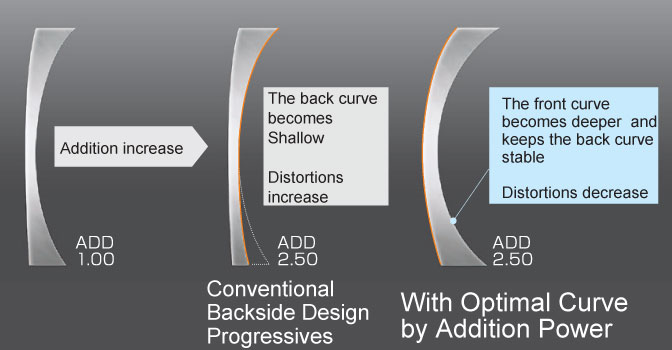Resonas Presso


This is the lens that you have been looking for...
A new spectacle lens developed with neuroscience, offering comfortable vision of near and slightly distant objects.
The biggest inconvenience that we have when developing presbyopia, is having difficulty seeing things that are close.
Conventional lenses for both near and far distances as well as those for short and intermediate distances allowed a sense of narrowness in nearby areas. However, single-vision and wide-vision lenses for reading have not been able to provide a sufficient sense of depth, which is important.
This is what Beluna Resonas Presso focuses on. It changes nearby width to depth that is slightly distant, which is used the most in everyday life, to clear and comfortable areas with less movement and distortions- made possible with our own ergonomic and neuroscience technology.
Beluna Resona Presso is now available as a revolutionary near-intermediate progressive addition lens developed with a new concept.
Beluna Resona Presso focuses on the area that is used the most in everyday life, which is 29 to 85cm from your eyes.(*)
This meets the most important need of those with presbyopia- which is wanting to see close objects more easily and clearly.
(*) 85cm: most used operating area in a seated position
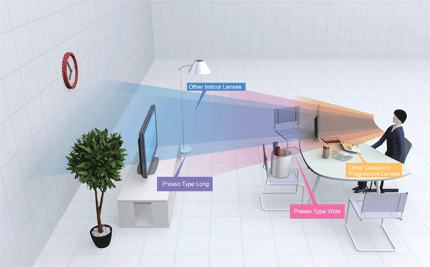
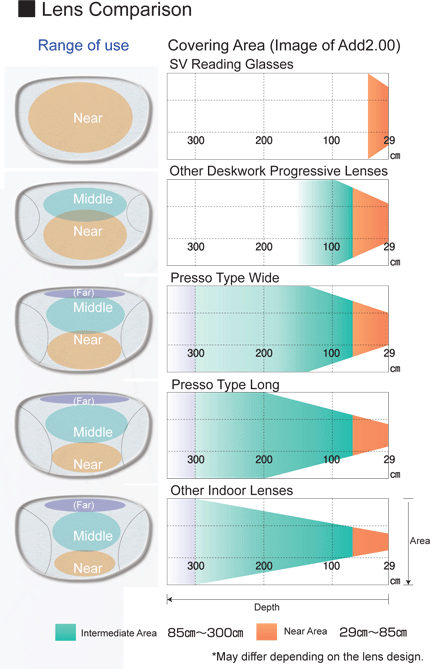
There are many daily users of lenses for both near and far distances who are concerned with handling and difficulty in seeing car navigation systems while driving.
Beluna Resonas Fit is a progressive addition lens that makes the area between the location in front of you and intermediate distances wider and mild.
■ Comparison of Eye Movement relating to the PC Distance
The need to move your chin to focus on the PC is reduced by widening the near-intermediate area of the RESONAS Presso. Other intermediate range lenses only availed the wearer to focus on to the PC using the bottom partial of the lens. There was a need for the wearer to hold up their chin to focus on the upper partial of the PC. In comparison, the wide near-intermediate area of the RESONAS Press covers the whole PC, thus there is no more need to hold up the chin.
Comparison of the Eye Movement in the PC Distance
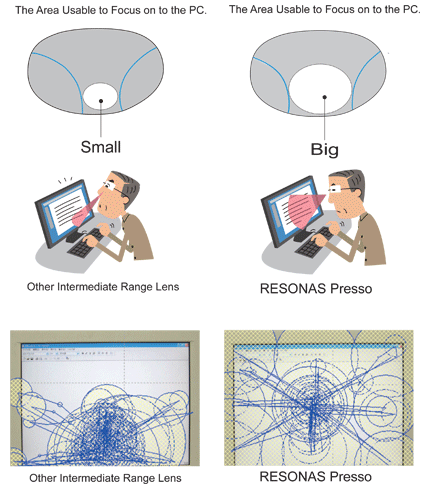
Best fits the modern lifestyle changes - comfort provided anywhere, any time.
The time we use the “Near” vision has increased due to the expanding use of smartphones and tablet devices. The RESONAS Presso is a lens that you can carry anywhere any time and put on to make your “Near” vision comfortable.
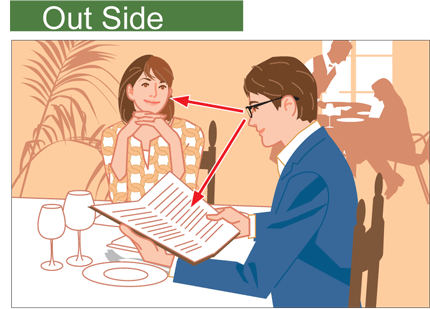
You can keep track with the projected graphs at the same time check your PC for additional information.
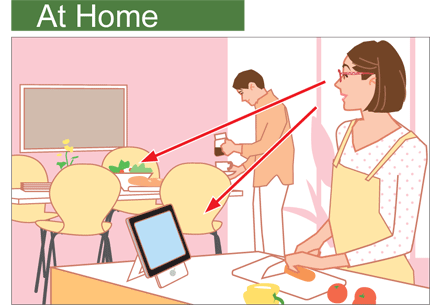
You can check the table cross the room without stopping your hands to cook.
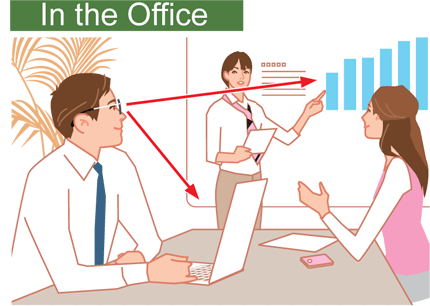
You can keep your eyes on your partners smile while at the same time checking the menu.
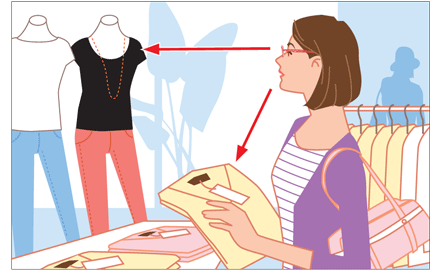
You can look at other items and t the same time check the price card to compare.
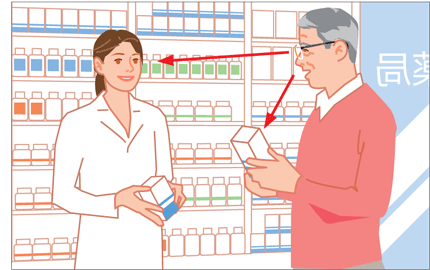
You can communicate face to face also check the scripts to confirm the instructions.
Beluna Resonas Fit is a progressive addition lens that makes it easy to see objects at medium distances, which is a huge part of our vision life.
RESONAS PRESSO WS / RESONAS PRESSO
Offering mild vision that is useful in the distances in our everyday lives.
Excellent fitting for far, intermediate and short distances made possible with the adoption of neuroscience in development and backed by the quantification of sensibility.
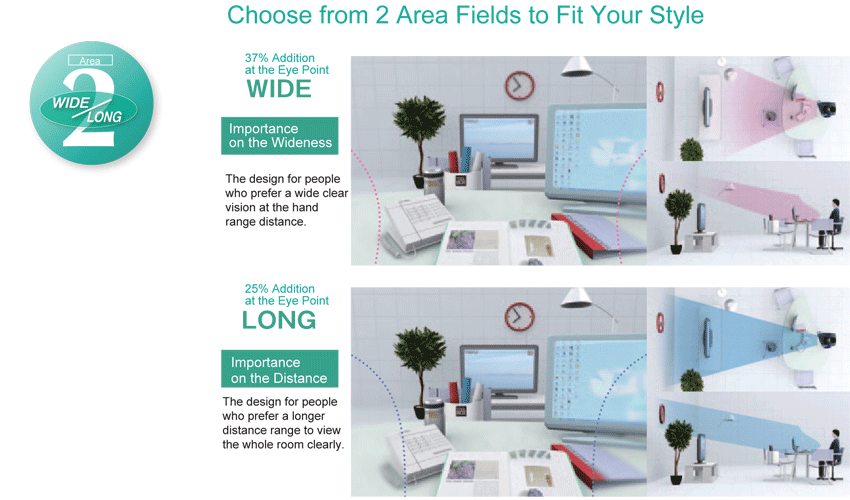
RESONAS PRESSO WS
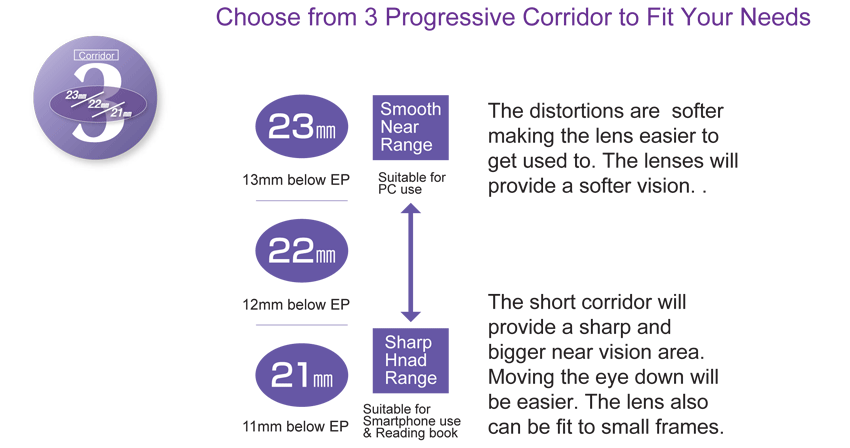
RESONAS PRESSO
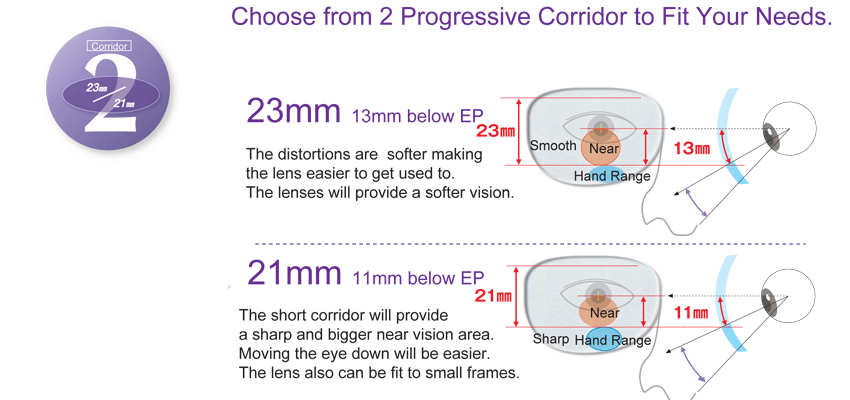
RESONAS PRESSO WS / RESONAS PRESSO
The Near Vision is Personalized According to Individual Data
The design can be specified for the personal inset and/or reading distance in order to stabilize the binocular vision.

Improvement of Peripheral Vision by Using Neuroscience - Feel Comfort Like Never Before.
Lens Design Using Neuroscience Technology
The New product, "RESONAS Presso" was developed as a result of the latest research with the National Institutes of Natural Sciences (Professor Kakigi Ryusuke, Associate Professor Inui Koji). TOKAI has been researching the Magnetoencephalography (MEG) using the latest scientific findings in the Neuroscience field, in aim to analyze how the brain is seeing while ophthalmic lenses are worn.
What is Manetoencephalogram (MEG)
The magnetoencephalography is a technique for mapping the brain activity by following the magnetic fields produced by the electric flow of the brain. The electric flow is caused by the excitement of the brain cells to transfer information. A magnetoencephalograph can map the brain activities safely and with useful details (such as milliseconds and in spatial resolution). A 306 channel magnetoencephalography is used at the National Institute.
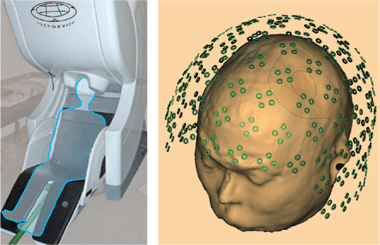
Analysis by Using Neuroscience, with Focus on Peripheral Vision.
The RESONAS Presso has been developed to provide comfort- more than just being able to "see" the image. In the conventional method of lens designing, central vision was spotted and evaluated throughout the lens surface even though peripheral vision around each central vision was not. For the RESONAS Presso, the lens was designed by putting this peripheral vision into focus.

Commodification After Numerous Evaluations on the Prototype Lens
The graph shows that the RESONAS press provides a faster response to peripheral vision. Thus, it can be said that the RESONAS press provides a much clearer vision than other intermediate range lenses. Numerous evaluations were held on other intermediate range lenses and the prototype lens in the developing process, to achieve the result of clearer vision in peripheral vision.
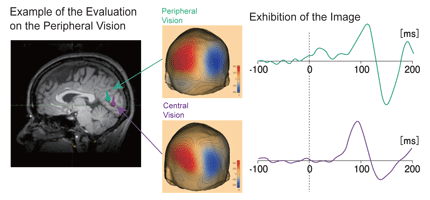
N-style Mild and Clarity Design
The distance range is controlled at the fitting point from the N-style Wide and Smooth Design. According to the new discoveries through Neuroscience, the clearness of the Peripheral Vision field is enhanced.
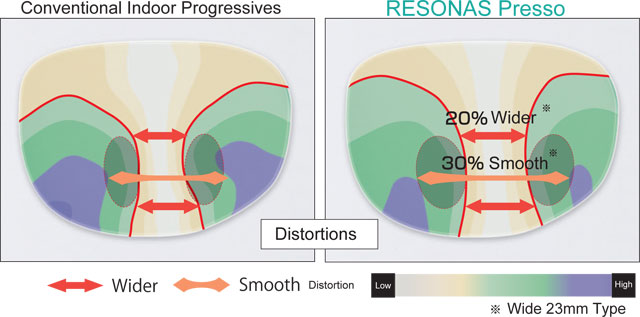
Optimal Curve by Addition Power
Vision when the eyes are moving is enhanced, by optimizing the distortion according to the inset amount.
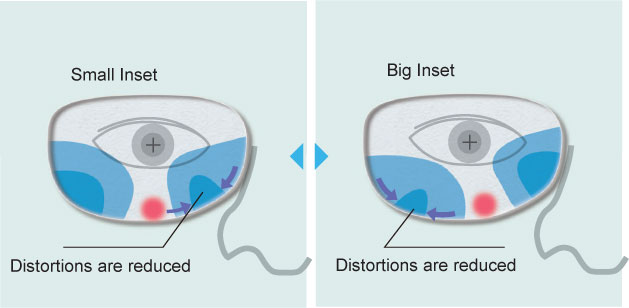
RESONAS PRESSO
Optimal Curve by Addition Power
A deeper front curve can be designed in proportion to the level of addition, stabilizing back curve variations and minimizing sways and distortions.
